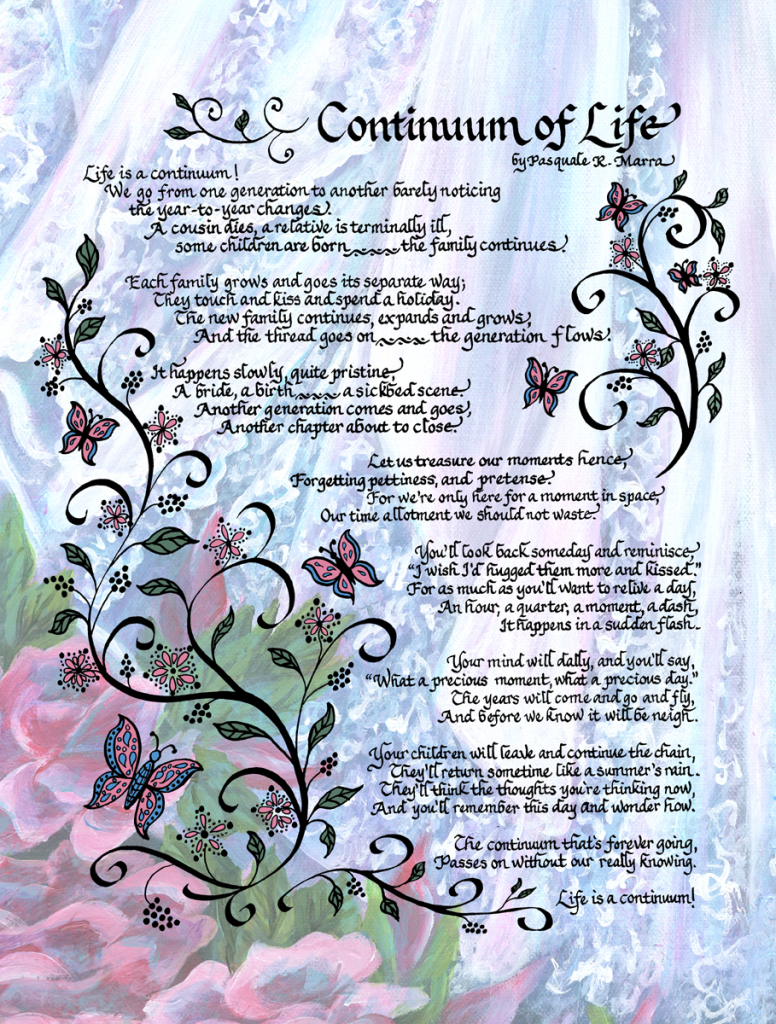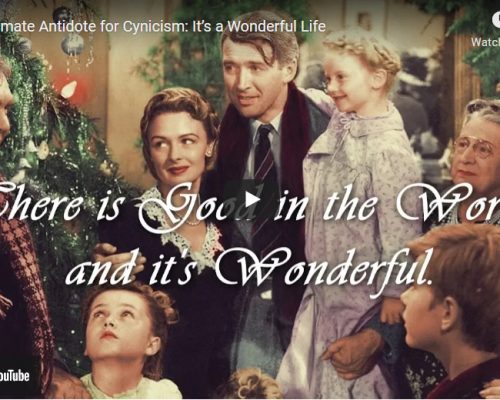The title of this piece comes from a line of a song that has always meant a lot to me, and I suppose I’m about to turn something completely on its head in transposed context.
First, I want to acknowledge that there could be some reading who might feel some difficult feelings in reading parts of this piece, perhaps, especially if they were unable or were never given the opportunity to become a parent, or if they have lost a child of any age. I am so sorry for this pain.
Yet carefully moving forward with some thoughts…
…if you are a parent, I ask you to imagine something for some moments.
I want you to pick an age where it is most likely that you will have passed away if you were to have reasonable longevity, and then, I want to you figure how old each of your grown children might reasonably live in longevity past the age of your death.
In other words, let me give an example.
I was 26 when my oldest son was born, and 30 when my youngest son was born. While no one knows the future, if I were to pick an age of longevity that might possibly be attainable, I suppose I would pick 100 years old. I’ve had relatives on each side live into their early-to-mid-nineties, but my own parents died when they were 65 and 78 (dad and mom, respectively).
So for example, if my oldest son lives to become an old man of at least 80 years old and my youngest an old man of at least 76, I’m fairly certain (though one can never know) that I will have passed into eternal life by that time. For me to imagine myself being 106 years old when they reach those ages, seems a stretch.
And while it could be more likely that my sons could be around my age now when I pass, that would mean they might remain on this earth another 25-35 or more years beyond that.
I guess I’m laying this out first (the possible math part) since people have a wide age at which they become parents…I have literally known someone who is now almost 90 had her first child at age 16, and a couple of friends who have given birth in their mid 40’s.
But let’s not get too hung up on math and adapting math, but rather, I want you to imagine (if you want) your child–whether they are one week old or fifty years old—as quite elderly. Maybe imagine them in their mid-nineties…
I’ve done this before at times as I contemplate a variety of things.
I imagine Zach a very old man, and maybe he’s outside alone in his gardens. Or, I imagine Jonathan a very old man, and maybe he’s in a studio alone listening to a recording he made when he was thirty and he’s thinking about music, and about life. Their hands might be swollen and arthritic like mine are becoming, and their faces quite weathered and wrinkled with age. They might walk unsteadily, and Zach’s once piercing green-gray-blue eyes and Jonathan’s deep Hershey-kiss brown eyes are now dulled, and milky. In my mind’s eye, as a mother, the image is almost inconceivable in that it is something I will literally never see with my eyes, and that I can only try to imagine.
These are some of the saddest images I can contemplate in my mind in some ways, because I know that I will never, ever get to see the end of their earthly story if they exceed me in longevity. And if those old men whose lives started in my womb and whom I nursed at my breast and gently touched their brand-new, smooth skin might get to thinkin’ what happened a long time ago…there will no longer be any opportunity for either of them and I to be appreciating one another’s company and comfort, or sharing a meal. Part of the sadness in this imagination is understanding that I will not be able to comfort nor care for my not-only-grown but exceedingly aged sons, nor to listen to them as they move into their final years, nor to know how their lives unfolded past my own death.
For some reason, when I’ve imagined them each in their last years of life, I seem to image them in my mind’s eye as alone and solitary. Not that they would literally be that way, but I just see a glimpse of each of them in my imagination’s mind’s eye–just them. And these images can bring tears to my eyes and a welling up of so many different thoughts and emotions.
There is a beautiful poem by Kahlil Gibran called “On Children,” and one line in particular strikes me and seems to summarize my imaginations above:
“For their souls dwell in the house of tomorrow, which you cannot visit, not even in your dreams.”
While we certainly do not know the hour and moment of either our own death or another’s, certainly in general, there is a truth in most lives that aging people bury their own parents at some point and then continue on into their own old age and decline alone. Alone in the sense that while others may sit by their death bed in their old age, and help them as they decline, it will not be the parents who gave them life to begin with.
Now, I suppose I could turn this thing on its head yet another time here.
What if...what if “being old” did not have anything to do with years but with percentage of life left. Then, in a sense we wouldn’t know how “old” we were, nor what tomorrow might bring. Surely humans live by this idea at times, but in reality, we tend to assume there will be a tomorrow.
Tomorrow, or next month or next year, maybe we can connect with someone we say that we love, or perhaps even, find a way to meet them halfway in a conflict and make things right. To not sabotage and shut down opportunities to connect, but to fix our eyes upon life and living, while there is yet opportunity…
Psalm 139:16 says of God:
“Your eyes saw my unformed body;
all the days ordained for me were written in your book
before one of them came to be.”
Surely different people have different views about God, life and death. But suppose for a moment that indeed, God knows/has determined/has planned to permit the exact hour and day of the end of your earthly life. For all I know, I have now lived 99.9999999% of my earthly life and I do not know what tomorrow will bring, nor if I will have a tomorrow…
So very sadly, every single day a parent somewhere receives a horrific phone call that a sudden tragedy has immediately and permanently closed any hope that they will see a young-but-grown child again on this earth. Or, tragedy may take a child from earth the same day they were born. And in these cases, imagine in God’s eternal-temporal clock, each of these young-in-years persons were in some sense a turned-on-its-head-concept of “old” because the length of their determined days had reached 100%.
It’s depressing to think about, and I’m sorry if these thoughts are difficult to read and contemplate. Maybe you are wondering where I’m going with all of this.
In my younger years I would occasionally know of someone that was in some state of estrangement from parents, but it was rare. I knew many people that had difficulties of many sorts with their parents (and parents who had difficulties with grown children), yet I can really only think of about one particular father-son relationship that was significantly estranged in various ways, though not completely.
Today, estrangement seems to be almost a fad among some subsets of young people. I read a Substack piece called The Other Side of Estrangement (Perspective of the Adult Children) last week that really struck me as worthy of sharing somehow. I’ve thought about it a number of times since I read it. It was full of some painful and profound truths and commentary on society, and more. While the context was primarily in one subset where estrangement seems to be a regular and increasing occurrence, as touched upon in the piece (or perhaps the comments) this phenomenon is not limited as such.
There just seems to be a general push for young people to hold their parents to impossible or unfair standards and to easily write them off, dismissing them as “toxic” and communicating an entitlement to sanction/punish them, teach them some lesson, or otherwise put them into their place.
The article grabbed me from the first line.
From the get-go, it used a term I’ve often selected before (and I had wondered if I had made it up myself or had heard it somewhere). Any piece that uses the word “psychobabble” in its first sentence is bound to grab my attention.
Psychobabble. What is that and where does it come from?
My opinion is that it is easy for unstable–even narcissistic or those with serious mental disorders–to self-platform online these days. Like many destructive things, we are witnessing a kind of social contagion in the “estrangement” arena.
Maybe these are young people who have had a few psychology classes or followed some “life-coach” on TikTok, or have otherwise immersed themselves in whatever echo-chamber they inhabit. What happens is they learn just enough about relationships, boundaries, abuse and other things to be “dangerous,”–as they say of many disciplines that require far deeper understandings and working knowledge/life experience of how to discern and apply various ideas. They don’t quite get that when they engage in psychobabble and especially, direct certain things toward their parents, that there is the possibility they are either projecting some of their own traits or have been mentally groomed in a way that they reinterpret the imperfectly-messy-human-normal of relationships for the abusive, toxic or otherwise worthy of forms of estrangement. Or, they fail to recognize that they are putting parents to the test through situations and ideology and deeply-ingrained beliefs that they consider normal and even righteous, that many parents simply cannot fully comprehend, though they might try or even wish to agree to disagree about.
Unlike the many parents who are on the receiving end and torment themselves beyond reason, wondering if these accusations toward them are true, and turning interactions every-which-way in their mind while examining their own thoughts and behaviors from every possible viewpoint…these young people don’t seem to understand that some of what they are learning should be used first to examine their own thoughts and behavior before weaponizing it toward parents.
It’s just so sad.
Because the truth is that life is short. We all end up in the same place at the end of our days…old, imperfect, in need, and without remaining opportunity to fix things we should have fixed.
I thought about a lot of things this afternoon, as most of my day was spent pruning and tending one of my big garden areas with strawberries and raspberries. I thought about my Uncle Bill on and off today, as today is his birthday and he would have been 103 years old, if my math is right.
Uncle Bill loved his gardens and his berries. And as I cut away raspberry canes that would not produce berries again, I thought about one of our trips to their home years ago where I learned from him that this was a yearly process. I always loved coming to their home in the summer and getting a slow tour throughout his massive gardens. And one time, he explained that he was cutting back the old canes and tying the new ones up.
Of course he must have given me a brief tutorial even though I didn’t grow berries then. I must have been curious, and likely I wondered why he would be cutting off branches that seemed green and healthy to my untrained eye. Uncle Bill so naturally taught gardening concepts in casual conversation.
I remember another time they visited us when Zach was very young baby. I had a whopperly-large red cherry tomato plant and I was proud to have Uncle Bill take a look at it! He showed me how to pinch off the “suckers” at the joints that day, and likely, other times after that.
I once asked Uncle Bill what his favorite hymn was and he told me, “This is My Father’s World.” I think that is one of my very favorites, as well. It’s sad for me to know that we have some generations that may live into their elderly years–long since not knowing or caring what their parent’s favorite hymn might have been (and especially, why), or a number of other things they might have considered worthy of their time when it had been an option to communicate love and willingly rise to the task of generational adulthood: the art of a grown child now listening and learning and taking in stories from their (elders) parents.
Jesus taught us many things through parables about nature–all kinds of stories about seeds and growing things, and about cutting off branches that don’t bear good fruit and throwing them into the fire, or, pruning those that do bear good fruit so that these vines will produce even more.
In that Substack article a number of parts stood out to me, but there was another in particular. The young person on Reddit had written: “I am no contact now.”
First of all, I found it very odd, grammatically.
But secondly, I pondered about the sentence’s structural implication of both identity and status. If we were to diagram the sentence (like people my age learned to do back in the day where we learned actual critical thinking skills rather than going through educational exercises aimed to teach us to see oppression everywhere we looked–including from our parents) it seems that “no contact” is a type of “status” that describes the person’s identity.
“I am…” (what are you?)…“no contact.”
Not, “Sadly, I have had to go “no contact” (a status) with my parents.”
Just a terse, cruel statement that is akin to an announcement of being included in the seeming rite-of-passage-and-goal status of the plethora of these young people caught up in this epidemic of estrangement. Young people that have been so indoctrinated by so much, and so fluent in their one-way, their-way-or-the-highway psychobabble, that they feel so confidently justified of their own actions.
It’s sad, all so sad.
Because someday, they too will be old, and ready to go.
Maybe, just maybe……when they are old, and ready to go, they’ll get to thinkin’ what happened a long time ago…
I seem to be in a contemplative, quotative state of mind this evening, and I want to wrap this expression up with a poem written by the father of one of my high school friends. Her father passed away several years ago, and he was so dearly loved. He had dedicated his life’s work as a high school teacher, and had a number of giftings, including writing.
When my friend Lisa and I got to talking about how old her father was when he wrote the poem, I remember we figured he was about the age we were then. Of course, he lived many years into his old age after writing this, and there is one line I found especially profound: “They’ll think the thoughts you’re thinking now…”

On Children
1883 –1931
And a woman who held a babe against her bosom said, Speak to us of Children.
And he said:
Your children are not your children.
They are the sons and daughters of Life’s longing for itself.
They come through you but not from you,
And though they are with you yet they belong not to you.
You may give them your love but not your thoughts,
For they have their own thoughts.
You may house their bodies but not their souls,
For their souls dwell in the house of tomorrow, which you cannot visit, not even in your dreams.
You may strive to be like them, but seek not to make them like you.
For life goes not backward nor tarries with yesterday.
You are the bows from which your children as living arrows are sent forth.
The archer sees the mark upon the path of the infinite, and He bends you with His might that His arrows may go swift and far.
Let your bending in the archer’s hand be for gladness;
For even as He loves the arrow that flies, so He loves also the bow that is stable.
From The Prophet (Knopf, 1923). This poem is in the public domain.
Thank You For Reading
Please Feel Free To Express Your Thoughts Below





Rosemary Kay Moyer
July 1, 2024Beautiful Eileen!
Well thought out and communicated.
I’m sending it on
eileenslifer
July 1, 2024Thank you, Rosemary!